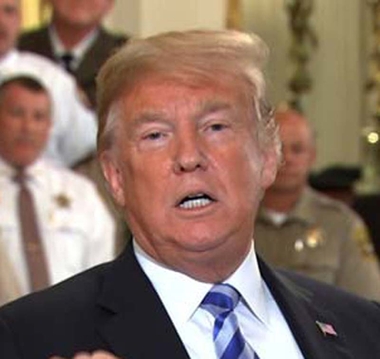More voters think Donald Trump is a racist than thought George Wallace was in 1968

ANALYSIS: A Quinnipiac University poll out this week shows that a majority (51 percent) of voters believe that President Donald Trump is a racist. Forty-five percent say that he is not.
To opponents of the President, this poll may not be surprising. But think about it for a second. This isn't just the normal opposition you'd expect to a president. This is a majority of voters saying their president is a racist.
Compare these numbers to a Harris poll from September 1968. Former Alabama Gov. George Wallace, a segregationist, was running for president as an opponent to the Civil Rights movement. As he campaigned, 41 percent agreed when asked whether Wallace was a racist. That was basically even with the 40 percent who disagreed with the statement.
There are a few ways to look at these numbers, and none are complementary to Trump. You can say that more voters believe Trump is racist than believed a segregationist running for president in 1968 was. You could be generous to Trump and say that the spread between racist and not a racist (five points in Trump's case and one point in Wallace's case) is closer because more voters were undecided on Wallace. Even so, the net margin for Trump being a racist is wider than it was in Wallace's case.
Perhaps, the one bit of decent news for Trump in these numbers is that they are fairly stable. Even before Trump's most recent comments, many voters thought he was racist. In the summer of 2018, 49 percent of voters said Trump was racist in a Quinnipiac poll. This was slightly higher than the 47 percent who said he wasn't racist.
Still, the latest polling indicates that the President was mistaken if he thought the latest attacks were going to help him. We don't just see that the President's attacks have been an electoral angle in the question about racism; we see it in Trump's approval ratings as well.
Trump's approval rating is 43 percent among all voters in a national average. A month ago, before his tweets against the four progressive congresswomen, his approval rating among voters was the same 43 percent.
It shouldn't be too surprising that Trump's approval rating has not gone up. Not only has his approval rating been steadier than any president in polling history, but we've seen him previously employ similar tactics that he did in his racist tweets. These methods have not moved the numbers.
Unfortunately for Trump, numbers such as these a year from now would mean that he would be an underdog for reelection. The last time Trump had an approval rating like this heading into a national election, the Democrats gained 40 House seats and won the House popular vote by 9 points.
Analysis by Harry Enten, CNN via The-CNN-Wire™ & © 2019 Cable News Network, Inc., a Time Warner Company. All rights reserved.





